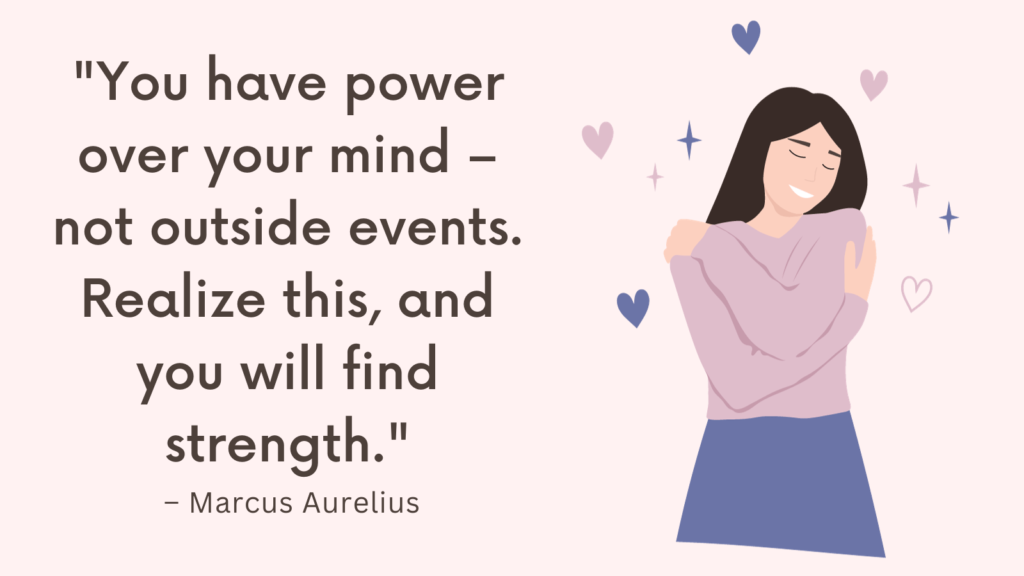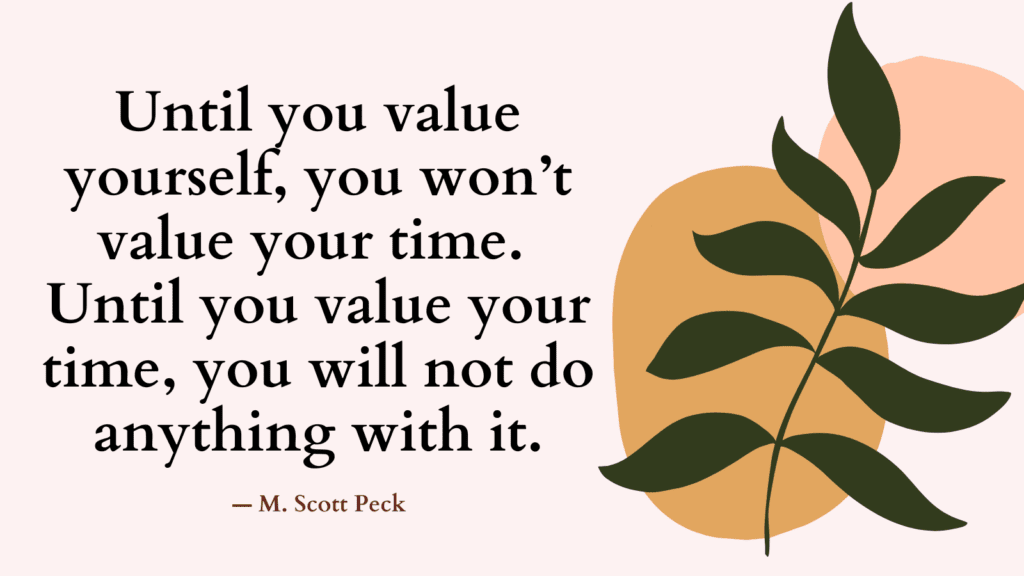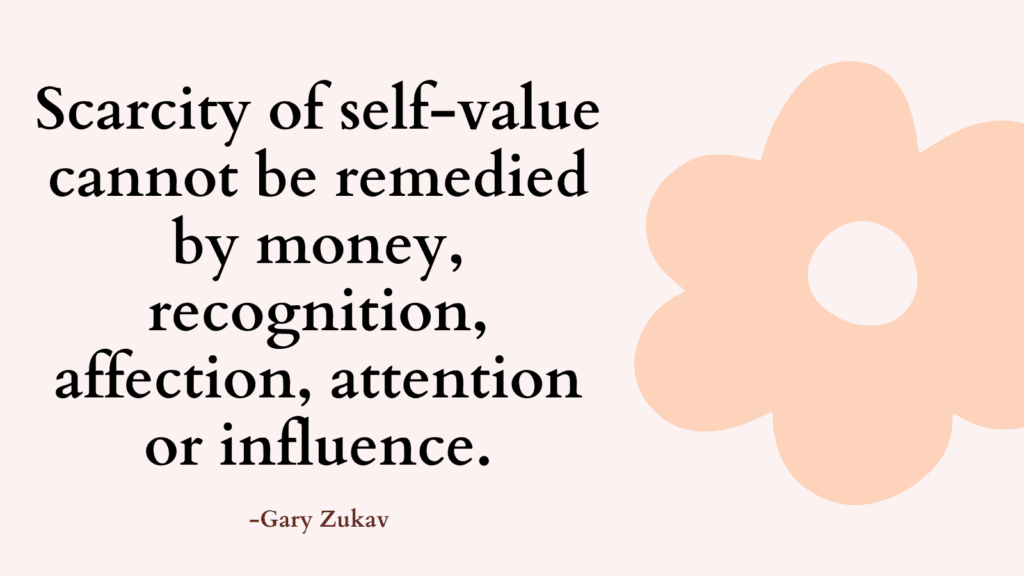This post contains some of the best positive affirmations for work stress.
What Are Positive Affirmations?
Positive affirmations are statements or phrases that are used to assert positive thoughts and beliefs about oneself or a specific situation.
They are designed to shift negative or self-limiting beliefs into positive and empowering ones.
When repeated regularly, positive affirmations can help individuals overcome self-doubt, build confidence, and create a more optimistic mindset.
The effectiveness of positive affirmations lies in the power of repetition and belief.
By consciously choosing to focus on positive thoughts and reinforcing them through affirmations, individuals can rewire their thought patterns, cultivate self-compassion, and improve their overall well-being.
Positive Affirmations for Work Stress
1. I am capable of handling any challenge that comes my way.
2. I am confident in my abilities and knowledge.
3. I am focused and determined to achieve my goals at work.
4. I embrace change as an opportunity for growth.
5. I am resilient and can bounce back from setbacks.
6. I am worthy of success and happiness in my career.
7. I trust myself to make wise decisions and choices.
8. I am open to learning and improving my skills.
Related: 35 Self Care Saturday Ideas To Try This Weekend
9. I am surrounded by supportive colleagues who believe in me.
10. I am grateful for the opportunities my job provides.
11. I am proud of my accomplishments and contributions at work.
12. I am organized and can effectively manage my workload.
13. I am calm, even in high-pressure situations.
14. I am deserving of recognition and appreciation for my hard work.
15. I maintain a healthy work-life balance, prioritizing self-care.
16. I am confident in my ability to meet deadlines and deliver quality work.
17. I have the power to create a positive work environment.
18. I am capable of finding creative solutions to problems.
19. I am motivated and driven to succeed in my career.
Related: Best 20 Low-Stress Jobs After Retirement
20. I approach each task with enthusiasm and a positive mindset.
21. I celebrate small achievements and milestones along the way.
22. I am patient with myself as I learn and grow professionally.
23. I handle conflicts with grace and find solutions that benefit everyone involved.
24. I trust myself to make sound decisions in uncertain situations.
25. I bring positivity and optimism to my workplace.
26. I let go of perfectionism and value progress over perfection.
27. I deserve to take breaks and recharge throughout the day.
Related: Top 10 Exercises to Cultivate an Attitude of Gratitude
28. I communicate confidently and effectively with my colleagues.
29. I am in control of my time and prioritize tasks effectively.
30. I am proactive and take initiative in my work.
31. I release any negative thoughts or emotions that hinder my productivity.
32. I find joy and fulfillment in my work.
35. I maintain healthy boundaries between work and personal life.
36. I am in control of my emotions and choose to respond positively to challenges.
37. I choose to focus on the present moment and let go of worries about the future.
Related: How Resilience Works? Top 10 Powerful Ways to Stay Healthy and Happy During Tough Times
38. My well-being is my top priority, and I will take care of myself.
39. I release tension and embrace relaxation in my body and mind.
40. I am resilient, adaptable, and strong.
41. Stress is temporary, and I have the power to overcome it.
42. I am surrounded by love and support from family and friends.
43. I deserve to prioritize self-care and take breaks when needed.
44. I am worthy of peace, calmness, and happiness.
45. I am open to seeking help and support when I need it.
Related: Top 13 Toxic Habits Everyone Should Quit To Build Emotional Resilience
46. I release the need to control things beyond my influence and focus on what I can control.
47. I choose to respond to stress in a healthy and productive way.
48. I release any expectations that cause unnecessary stress and embrace acceptance.
49. I am in control of how I react to stressful situations.
50. I choose to focus on the solution rather than dwelling on the problem.
51. I am capable of finding peace and calmness within myself, regardless of external circumstances.
52. I trust in the process of life and know that everything happens for a reason.
53. I am deserving of rest and relaxation to recharge my mind and body.
54. I have the power to choose peace and calmness in the midst of chaos.
55. I am resilient, and I can overcome any obstacle that comes my way.
Related: Resiliency Quiz: Am I Resilient?
Why Use Positive Affirmations for Work Stress?
Using positive affirmations for work stress can be beneficial in several ways. Here’s why:
1. Shifting mindset: Affirmations help shift your mindset from a negative or stressful perspective to a more positive and empowering one. By repeating affirmations related to work stress, you can start reprogramming your subconscious mind to focus on solutions, resilience, and a sense of calm.
2. Stress reduction: Affirmations have the potential to reduce stress by promoting relaxation and a sense of control. By repeating affirmations that instill confidence, self-belief, and inner strength, you can counteract the negative effects of stress and build resilience to challenges at work.
3. Increased self-confidence: Work stress can often lead to self-doubt and a lack of confidence. Affirmations that emphasize your skills, abilities, and accomplishments can help boost your self-esteem and restore confidence in your capabilities.
4. Enhanced productivity: When stress levels are high, productivity can suffer. Positive affirmations targeted towards improving focus, concentration, and motivation can help increase productivity by aligning your thoughts with a positive work mindset.
5. Improved self-care: Work stress can take a toll on your overall well-being. Affirmations centered around self-care and setting healthy boundaries remind you to prioritize your mental, emotional, and physical health. This can help create a better work-life balance and reduce the impact of stress on your overall quality of life.
Related: How To Live A Peaceful Life? 101 Timeless Principles to Find Peace Within Yourself
How to Use Positive Affirmations for Work Stress?
To effectively use positive affirmations for work stress, follow these steps:
1. Identify specific stressors
Start by identifying the specific aspects of work that cause you stress.
Is it deadlines, a heavy workload, difficult coworkers, or something else?
This will help you tailor your affirmations to address those particular stressors.
2. Choose empowering affirmations
Once you’ve identified your stressors, select affirmations that counteract those negative thoughts.
For example, if you struggle with self-doubt, affirmations like “I am competent and capable” or “I have the skills needed to handle any challenge” can help build confidence.
Related: Best 6 Ways to Let Go of Wanting to Control Everything
3. Practice daily repetition
Recite your chosen affirmations consistently and regularly.
It’s helpful to incorporate them into daily routines, such as saying them in the morning when getting ready for work or during breaks throughout the day.
Repetition is key to rewiring your thoughts and beliefs.
4. Use visualization techniques
As you repeat your affirmations, visualize yourself successfully handling the stressors at work.
Imagine yourself feeling calm, focused, and in control.
Visualization enhances the effectiveness of affirmations by reinforcing positive images in your mind.
5. Write them down
Consider writing your affirmations on sticky notes or in a journal.
Having a physical reminder of your affirmations can help reinforce them and serve as a visual cue during challenging moments.
6. Believe in their truth
As you repeat your affirmations, truly believe in their truth and power.
Embrace them as facts rather than empty words.
The more you genuinely believe in the affirmations, the more impact they will have on reducing work stress.
Remember, incorporating positive affirmations alone may not be sufficient for managing work stress.
It’s important to also address underlying issues, seek support from colleagues or professionals, and utilize additional stress management strategies as needed.
Related: Top 7-Day Acceptance Challenge For A Peaceful Life

Coping Strategies for Work Stress
Coping with work stress is crucial for maintaining your well-being and performance in the workplace. Here are some coping strategies to help you manage work-related stress effectively:
1. Time management
Poor time management often leads to increased stress levels.
Prioritize tasks based on importance and urgency, create realistic schedules, and break larger tasks into smaller, manageable ones.
Setting clear goals and deadlines can help reduce stress by providing a sense of control and accomplishment.
2. Establish boundaries
Maintain a healthy work-life balance by setting clear boundaries between work and personal life.
Avoid overworking or bringing work home excessively.
Allocate time for activities you enjoy outside of work, such as hobbies, exercise, or spending time with loved ones.
Taking breaks during the workday is also important for rest and rejuvenation.
3. Seek social support
Connecting with supportive colleagues can provide emotional support and a sense of belonging, which helps buffer stress.
Engage in open communication, express concerns or challenges, and seek advice when needed.
Having a strong support network can also foster a positive work environment.
Related: Top 14 CBT Exercise For Anger Management (+FREE Anger Worksheets)
4. Practice relaxation techniques
Incorporating relaxation techniques into your daily routine can reduce work stress.
Deep breathing exercises, progressive muscle relaxation, mindfulness meditation, or yoga are effective methods for promoting relaxation and reducing symptoms of stress.
Find what works best for you and make it a part of your regular routine.
5. Engage in physical activity
Regular exercise has numerous benefits for managing stress.
It releases endorphins, improves mood, reduces anxiety, and enhances overall well-being.
Aim for at least 30 minutes of moderate-intensity exercise most days of the week, whether it’s walking, jogging, cycling, or participating in a fitness class.
6. Develop healthy habits
Adopting a healthy lifestyle can improve your resilience to stress.
Ensure you get enough sleep each night (7-9 hours for adults), eat a balanced diet, and limit your consumption of caffeine, nicotine, alcohol, and other substances that can negatively impact stress levels.
Taking care of your physical health can positively influence your mental and emotional well-being.
Related: What Causes Cognitive Distortions? (+Top 10 Common Cognitive Distortions & How To Challenge Them)
7. Practice cognitive restructuring
Negative thinking patterns contribute to heightened stress levels.
Challenge and replace negative thoughts with more realistic and positive ones.
For example, if you catch yourself thinking, “I can’t handle this workload,” reframe it to say, “I have successfully managed challenging tasks before, and I can do it again.”
8. Utilize problem-solving skills
Find constructive solutions to work-related problems rather than dwelling on them.
Break down the problem, brainstorm potential solutions, weigh the pros and cons, and implement the most feasible option.
Problem-solving skills help regain a sense of control over stressful situations.
9. Take care of your emotional well-being
Acknowledge and accept your emotions related to work stress.
Engage in self-care activities that promote emotional well-being, such as journaling, practicing gratitude, or engaging in hobbies.
Seeking therapy or counseling can also provide valuable support and guidance in managing work-related stress.
10. Foster a positive work environment
Advocate for a supportive and healthy work environment.
Encourage open communication, establish respectful relationships with colleagues, and promote work-life balance.
Participate in activities that promote camaraderie and team building, which can enhance job satisfaction and reduce stress levels for everyone involved.
It’s important to note that these coping strategies may not be a one-size-fits-all solution.
Experiment with different techniques, adapt them to your needs, and seek professional help if work stress persists or significantly impacts your well-being.
Related: +20 Overgeneralization Examples & How to Avoid It

Conclusion
While affirmations alone may not solve all problems, they can be a valuable tool in conjunction with other strategies for personal development and emotional well-being.



